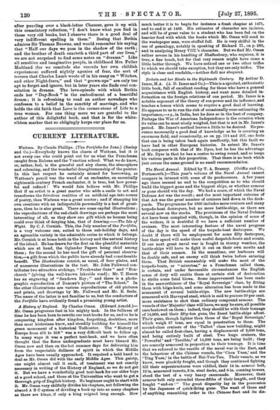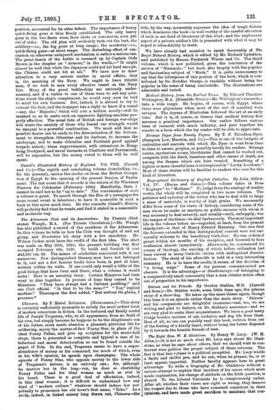The Naval Annual. Edited by T. A. Brassey. (Griffin and
Co., Portsmouth.)—This year's volume of the Naval Annual cannot compare in interest with some of its predecessors. A few years ago there seemed no end to the competition as to who should build the biggest guns and the biggest ships, or whether armour or guns should win the day. We had a scare, of which the Naval Defence Act was the result ; and the most important outcome of that Act was the great number of cruisers laid down in the dock- yards. The programme for 1896 includes more cruisers and many torpedo-boat destroyers, but no more battle-ships, as there are several now on the stocks. The provisions of the Naval Defence Act have been complied with, though, in the opinion of some of the writers, it is doubtful if we have a sufficient number of cruisers. The most interesting feature of the naval progress of the day is the speed of the torpedo-boat destroyers. We doubt if there will be employment for some fifty destroyers, but their speed will make them useful despatch-boats and scouts. If our next great naval war is fought in stormy weather, the battle-ships will have to fight it out on their own merits and that of their seamen. In the meantime, our harbours will be doubly safe, and an enemy will think twice before entering them. That British seamanship will make the most of the torpedo-boats, or " microbes," as a Frenchman called them, is certain, and under favourable circumstances the English sense of duty will enable them at certain risk of destruction to strike some fatal blows. Some improvement has been made in the seaworthiness of the 'Royal Sovereign' class, by fitting them with bilge-keels, and some alteration has been made in the armament of several battle-ships. The new battle-ships are armoured with Harveyed steel, which is said to possess 50 per cent. more resistance to shot than ordinary compound armour. The vessels of the' Majestic' class will have, we may be sure, all possible care bestowed on them ; indeed, they should be with their tonnage of 14,900, and their fifty-ton guns, the finest battle-ships afloat. Their guns, though lighter than those of the Royal Sovereign, which weigh 67 tons, are equal in penetration to them. The second-class cruisers of the ' Talbot' class now building, might almost be called first-class, having a displacement of 5,600 tons, and being entirely built of steel. Two huge cruisers, the Powerful' and Terrible,' of 14,200 tons, are being built ; they are scarcely armoured in proportion to their tonnage. It is time, that we referred to the results of the naval war in the East, and the behaviour of the Chinese vessels, the Chen Yuen,' and the Ting Yuen,' in the battle of Hai-Yun-Tau. Their vessels, as we know, were pluckily fought, and though they continued fighting till their superstructures were riddled, their 14 in. armour belt, 12 in. armoured turrets, 3 in. steel decks, and 8 in. conning-towers. stood the test of a very heavy cannonade. Moreover, their armour-belt only extended three-fifths of their length, and they fought "end-on ! " The great disparity lay in the possession by the Japanese of quick-firing guns. The want of these and of anything resembling order in the Chinese fleet and its dis-
position, accounted for its utter defeat. The importance of heavy quick-firing guns is thus firmly established. The only heavy guns in the two fleets were, from shots or concussion, soon put out of order. The old plan will evidently turn out the best, the artillery—i.e., the big guns at long range ; the musketry—i.e., quick-firing guns—at short range. The disturbing effect of con- cussion on otherwise uninjured mechanism is rather a serious one. The great lesson of the battle is summed up by Captain Orde Brown in the chapter on " Armour," in the words,—" It might almost be said that while the Japanese could not hit hard enough, the Chinese could not hit at all." We have now to draw attention to a very serious matter in naval affairs, that is, the manning of the Navy. We ought to have 100,000 men, if we wish to man every effective vessel on the Navy List. Many of the great battle-ships are seriously under- manned, and if a visitor to one of them were to ask any ques- manned so as to make such an expensive fighting-machine pro- will abate the anxiety of those who feared our strength would be unequal to a powerful combination. We must add that no possible demur can be made to the determination of the Govern- ment to strengthen Gibraltar and its harbour, to increase the anchorage, and to make Gibraltar and Portland proof against torpedo attack; these improvements, with extensions to Hong- kong Dockyard, and naval barracks at Chatham and Portsmouth, will be expensive, but the money voted to them will be well



































 Previous page
Previous page